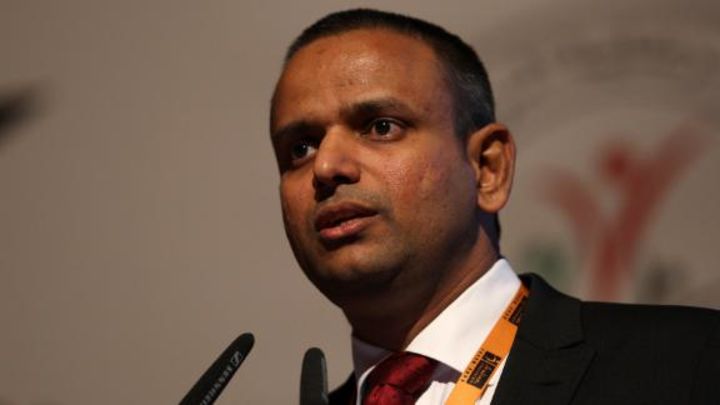Supreme Court to hear BCCI clause amendments
The Supreme Court will examine in detail the BCCI clause that made a significant change allowing "administrators" to have a "commercial interest" in the IPL and the Champions League T20
Ugra: No defence for officials not acting on crucial information
Gaurav Kalra and Sharda Ugra talk about the BCCI clause the Supreme Court will examine and the developments on Sundar Raman not responding to information regarding betting in the IPLThe Supreme Court will examine in detail the BCCI clause that made a significant change allowing "administrators" to have a "commercial interest" in the IPL and the Champions League T20. As part of hearings in the 2013 IPL corruption case, the two-judge bench of Justice TS Thakur and Justice FM Kalifullah will listen to arguments around the validity of the clause when the hearings resume on Tuesday afternoon.
Speaking as part of the first of two 'interventions' in the IPL corruption case, Rajeev Dhawan, counsel appearing for former BCCI president IS Bindra, said clause 6.2.4 was "responsible for the mess we [referring to Indian cricket] are in since 2008." It needed to be examined more closely in the court, he said because cricket, once described as "the greatest game on earth" was now, "going to the dogs."
When the issue of examining clause 6.2.4 was first raised, N Srinivasan's counsel Kapil Sibal argued that Bindra was an "interested" party in the original litigant Cricket Association of Bihar's (CAB) case against his client and the BCCI and therefore it should not be permitted. Dhawan argued that he was going to tackle the subject on three counts: the argument of autonomy, conflict of interest and "where do we go from here."
Dhawan also pointed out that the BCCI had both "a commercial and public interest" and said, "it can't be that the commercial interest should dominate over the public interest." Dhawan called the clause a "bombshell" for the parties concerned. The clause allowing BCCI administrators to have a commercial interest in IPL and Champions League T20 was only amended after the first season of the IPL. The Chennai Super Kings franchise, owned by N Srinivasan's India Cements, thus came into existence and participated in the first IPL season well before the BCCI constitution was amended in September 2008.
The bench said that there was a choice: either the court could itself rule on the "validity" of the clause or it could be studied by a new committee to extend its example and precedent to other sports bodies. "We can't gloss over 6.2.4. The BCCI has to defend the amendment," Justice Thakur said and the bench decided to hear the matter in its entirety on Tuesday.
The hearings in the Supreme Court today opened with arguments by Rajasthan Royals co-owner Raj Kundra and IPL COO Sundar Raman before Dhawan made his first arguments which will conclude on Tuesday.
IPL COO Sundar Raman, represented by counsel V Giri argued that he was appearing in court to defend the Mudgal committee's findings against him which covered two topics: the first being in contact with Vindoo Dara Singh, who was termed as the "contact" of a bookie and was arrested along CSK official Gurunath Meiyappan. The second was about not responding to information about betting by IPL owners five months before the first arrests of IPL players on May 16, 2013.
Raman said he was merely an employee of the BCCI and had no commercial stake in the IPL and could not, "decline any calls that come to me," including those of Vindoo who was described as a "celebrity." The counsel said Raman could not have acted without evidence and doing so would have put his job in "jeopardy."
With reference to the information passed onto him by YP Singh, head of the ICC Anti Corruption and Security Unit, about rumours of betting by two owners in the IPL, Raman said, YP Singh had not given him anything "in writing" and that it had not been "actionable" information.
The bench responded by asking why Raman had not followed up on the information: "You knew [the] role of officials in betting, you did nothing despite the knowledge, was it like putting your job at stake?"
When argued that there had been no evidence, Justice Thakur asked Raman's counsel, "What material did you expect? Did you think these people keep cash books and ledgers? Someone calls and says, ABC is betting, what will you ask? You will say you need actionable information?"
Kalifullah then asked whether Raman had not deemed it right to register a complaint with his employers itself to begin with. "When the complaint was about betting, did it not occur to you that you should gather more information and seek guidance from anyone else in BCCI? Why did you not do it? Why did you not put it down in writing in a report to BCCI?" Kallifullah said to Raman's counsel, "You have done nothing. You are only looking after celebrities and just watching the fun."
Kundra's counsel Shekhar Naphade argued for nearly an hour that action could only be taken against his client under the BCCI rules. He argued that as the Mudgal committee had not been formed under the BCCI rules, the court could not go by its findings and that his client should be allowed to cross question the report. Justice Thakur then said to him, "You are saying that even if there are problems [in Indian cricket], the court should not intervene."
The hearings resume on Tuesday afternoon.
Read in App
Elevate your reading experience on ESPNcricinfo App.
